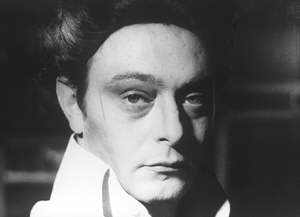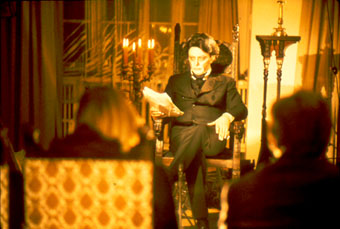







Fassbinder: Satansbraten
SATANSBRATEN
Regie & Buch: R. W. Fassbinder; Kamera: Jürgen Jürges, Michael Ballhaus; Schnitt: Thea Eymèsz; Musik: Peer Raben; mit Kurt Raab, Margit Carstensen, Helene Vita, Volker Spengler, Ulli Lommel u.a.
BRD 1975/76 112 Min.

Listed among "the most disgusting German films" by Fassbinder himself, Satan's Brew is a scalding, misogynist portrait of a "revolutionary" poet, Walter Kranz, who has nothing left but debts and a nagging wife. Suffering from writer's block, he begins to take himself for symbolist poet Stefan Georg, gradually adopting both Georg's lifestyle and homosexual orientation. "This may be the director's most profound and painful work. The nostalgia running through it nourishes no illusion, but rather a sort of nihilistic lucidity." (Michel Marmin) According to Wilfried Wiegand, there is "almost a hatred of humanity, which breaks through ... demolishing all the boundaries of good taste and narrative culture." "This is an experiment that has to do with a lot of totally personal things that I´ve been involved with, that has something to do with my attitude when I read the newspaper, how I react on things, or when I am talking to people who go on as if it were still 1968, and what happened to me then , the kind of aggressions that I vented then . . . and that are still coming out of me and how I am still trying to overcome that, because I tell myself, that is still the right way. Out of this complete muddle of feelings and thoughts I tried to tell a clear story." (Rainer Werner Fassbinder, 1976)
Fassbinder’s exploration of Antonin Artaud’s Concept of the Theater of Cruelty. This absurdist romp makes for an accessible and highly entertaining dose of experimental filmmaking. Kurt Raab delivers another brilliantly tortured performance as the film’s egomaniacal protagonist. Walter Kranz is a poet who embarks on a course of self destruction in his attempt to overcome a case of writers block. Kranz, who is entirely self-absorbed and petulant, lives with his nagging but permissive wife and his deranged, half-wit brother. He murders his patroness/lover for her cash on hand and spends the rest of the film attempting to elude the police. The money from the murder is enough to avert a financial crisis long enough for him to begin to execute his latest work in the form of a plagarization of poet Stefan George. His frustration when this work is met with indifference and criticism drives him into a delusional state where he believes himself to actually be Stefan George. Foremost, this film is a comment on the cult of the artist. Kranz surrounds himself with an assortment of characters who, convinced of his greatness, willingly endure his mistreatment. Ourselves, removed to the viewers perspective, can only see their senseless acceptance of their own abuse. However there are other layers of motif here. Money, power, apathy, and Fassbinder’s hallmark alienation are all well represented and benefit from his keen sense of observation.
Der Dichter Walter Kranz (Kurt Raab) befindet sich in einer totalen Schaffenskrise: Ihm fällt nichts mehr ein. Geblieben sind Schulden, eine keifende Ehefrau (Helen Vita) und ein debiler Bruder (Volker Spengler), der tote Fliegen sammelt. Doch nachdem Kranz seine reiche Geliebte hingemeuchelt hat, fließt die dichterische Ader wieder, nur erweist sich sein Werk als Plagiat eines Stefan- George-Gedichtes. Da steigert sich Kranz in den Wahn, selber George zu sein. Die Ersparnisse einer glühenden Verehrerin (Margit Carstensen) erlauben es ihm, junge Schauspieler zu engagieren, die gegen Bezahlung den bewundernden Kreis von Jüngern abgeben.
Auch ein Versuch, als Homosexueller zu reüssieren, gehört zu Kranz' Kreativ-Übungen. Aber dann ist das Geld ausgegeben, auch das, welches er seinen Eltern geklaut und einer Prostituierten abgepresst hat. Die „Jünger“ machen sich davon. Kranz wird nun völlig größenwahnsinnig. Faschistische Ideen überkommen ihn. Das Chaos im Tollhaus ist nicht mehr zu bändigen. Kranz fertigt einen großartigen Roman, wird verprügelt, dann auch noch erschossen, aber schließlich erstehen alle Leichen fröhlich wieder auf.
Aus: http://www.fassbinderfoundation.de/02_einzel_seiten/30.html

Mehr:
http://www.dasfilmarchiv.de/fassbinder.html
http://home.t-online.de/home/nor.lin/maxim/fassbinder12.html
http://www.bremerzeitkultur.de/99-Archiv/02/06/bkz-seite_6.html
(Satansbraten auf dem Bremer Theater!!)
�
Navigation: | Swiki Top | Lebensreform | Inhalt |
Link to this Page
- MATERIALIEN last edited on 11 July 2006 at 9:29 pm by e176064196.adsl.alicedsl.de


